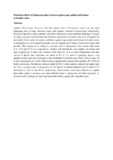Please use this identifier to cite or link to this item:
https://cris.library.msu.ac.zw//handle/11408/1740Full metadata record
| DC Field | Value | Language |
|---|---|---|
| dc.contributor.author | Muzemu, Simbarashe | - |
| dc.contributor.author | Mvumi, B.M. | - |
| dc.contributor.author | Nyirenda, S.P.M. | - |
| dc.contributor.author | Sileshi, G.W. | - |
| dc.contributor.author | Sola, P. | - |
| dc.contributor.author | Chikukura, L. | - |
| dc.contributor.author | Kamanula, J.F. | - |
| dc.contributor.author | Belmain, S.R. | - |
| dc.contributor.author | Stevenson, P.C. | - |
| dc.date.accessioned | 2016-08-03T12:33:17Z | - |
| dc.date.available | 2016-08-03T12:33:17Z | - |
| dc.date.issued | 2011 | - |
| dc.identifier.issn | 1023-070X | - |
| dc.identifier.uri | https://www.researchgate.net/publication/233992248 | - |
| dc.identifier.uri | http://hdl.handle.net/11408/1740 | - |
| dc.description.abstract | Aphids, Brevicoryne brassicae and Red spider mites, Tetranychus evansi are the most damaging pests of rape, Brassica napus and tomato, Solanum lycopersicum, respectively. Farmers respond by using synthetic pesticides which pose environmental challenges. Extracts of Lippia javanica leaf powder and Solanum delagoense ripe fruit pulp were evaluated for pesticidal effects under on-station conditions against rape aphids and tomato red spider mites as alternatives to conventional pesticides and in comparison to Neem, Azadirachta indica leaf powder. The extracts of A. indica, L. javanica and S. delagoense were mixed with water at 8, 12.5 and 25 % w/v respectively. Amitraz and dimethoate were applied on tomato and rape respectively at label rate. Extracts were kept for 24 h at room temperature and then sieved. A liquid soap surfactant was added at 0.1 % v/v, prior to spraying. Sprays were applied weekly once pest infestations had established within the crop. Pests were counted 24 h after spraying for six weeks. Plant extracts significantly reduced pest numbers (P < 0.05) in both experiments. Dimethoate reduced aphid by 96 % while amitraz reduced red spider mite by 72%. L. javanica and S. delagoense at 12.5 and 25 % reduced aphids by 63 % and 57.9 % and mites by 66.5 % and 55 %, respectively. Both extracts were more effective on aphids than mites while L .javanica was more effective than S. delagoense on both crop pests. L. javanica and S. delagoense had some pesticidal effects against the vegetable pests. | en_US |
| dc.language.iso | en | en_US |
| dc.publisher | African Crop Science Society | en_US |
| dc.relation.ispartofseries | African Crop Science Conference Proceedings;Vol. 10, p. 171 - 173 | - |
| dc.subject | Lippia javanica, pesticidal effect, rape aphids, Solanum delagoense, tomato red spider mites | en_US |
| dc.title | Pesticidal effects of indigenous plant extracts against rape aphids and tomato red spider mites | en_US |
| dc.type | Article | en_US |
| item.fulltext | With Fulltext | - |
| item.openairetype | Article | - |
| item.grantfulltext | open | - |
| item.languageiso639-1 | en | - |
| item.openairecristype | http://purl.org/coar/resource_type/c_18cf | - |
| item.cerifentitytype | Publications | - |
| Appears in Collections: | Research Papers | |
Files in This Item:
| File | Description | Size | Format | |
|---|---|---|---|---|
| Pesticidal effects of indigenous plant extracts against rape aphids and tomato.pdf | Abstract | 6.55 kB | Adobe PDF |  View/Open |
Page view(s)
242
checked on Mar 5, 2026
Download(s)
94
checked on Mar 5, 2026
Google ScholarTM
Check
Items in MSUIR are protected by copyright, with all rights reserved, unless otherwise indicated.



